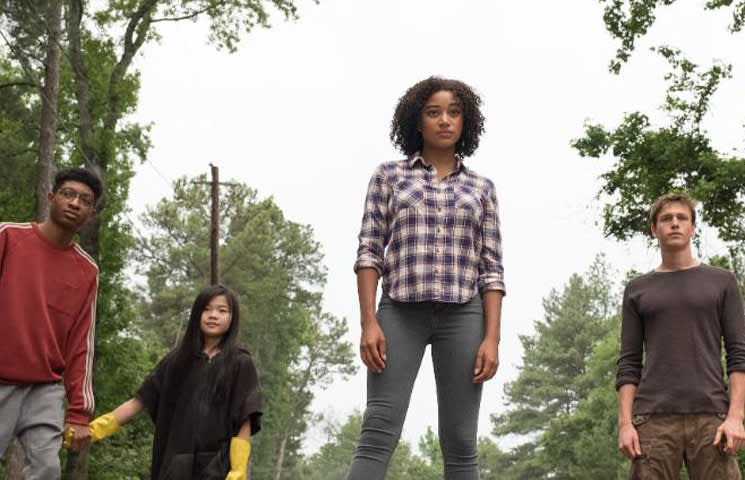The Darkest Minds is the latest in a trend of teen dystopia movies, following like-minded book adaptations including The Maze Runner and The Hunger Games. But while those predecessors portrayed compellingly bleak futuristic societies, The Darkest Minds is just a schlocky teen romance with a post-apocalyptic backdrop.
The film imagines a near-future version of America where children suddenly begin dying off from a mysterious disease. The few kids who survive are left with enhanced abilities, and they're colour-coded according to their cheesy glowing eyes: greens have heightened intelligence, blues have telekinetic powers, yellows can control electricity, and so on. Our hero Ruby (Amandla Stenberg) is a rare orange, meaning she can control minds. The government is so threatened by these super-enhanced kiddos that they imprison them in work camps, and kill off any oranges and reds. Ruby poses as a green, and she eventually escapes with some help from her benevolent doctor Cate Connor (Mandy Moore).
This part of the story has some logical and thematic flaws — the decision to imprison an entire generation is a blatantly near-sighted choice for even the most brutal of totalitarian states, and there's not much of a political message beyond "oppression is bad." Considering that the real world feels a bit like a dystopia these days, The Darkest Minds disappointingly doesn't have much to say about despotism. Still, this is by far the strongest part of the film, as Stenberg is compelling as a young adult adjusting to her grim new reality.
The film loses its way, ironically, when Ruby finds hers: just as the post-apocalyptic struggle is getting interesting, Ruby's life takes a turn for the better, as she links up with a band of young runaways including the charmingly brusque Chubs (Skylan Brooks) and the blandly anonymous Liam (Harris Dickinson). The movie would have been far better had she fallen for Chubs, but unfortunately she falls for the thoroughly boring Liam, with whom she shares plenty of rigid dialogue and doe-eyed glances in sunny wheat fields. The saccharine strings of Benjamin Wallfisch's score make these scenes particularly unbearable.
Really, there's nothing that makes a dystopia seem less threatening than a shopping montage in a mall that's lit up by Christmas lights.
Making matters worse, The Darkest Minds suffers from the same pacing issues that many book adaptations face, as the heroes move rapidly from one conflict to the next without properly ramping up the tension. With a runtime of well under two hours — far too much of which is dominated by corny romance — the story is underdeveloped and the twists come far too quickly to feel invested.
The Darkest Minds is based on the book series by Alexandra Bracken, meaning that this film is just the first chapter of the story and will presumably be followed by at least a couple of sequels. Can't we just have another Hunger Games movie instead?
(Fox)The film imagines a near-future version of America where children suddenly begin dying off from a mysterious disease. The few kids who survive are left with enhanced abilities, and they're colour-coded according to their cheesy glowing eyes: greens have heightened intelligence, blues have telekinetic powers, yellows can control electricity, and so on. Our hero Ruby (Amandla Stenberg) is a rare orange, meaning she can control minds. The government is so threatened by these super-enhanced kiddos that they imprison them in work camps, and kill off any oranges and reds. Ruby poses as a green, and she eventually escapes with some help from her benevolent doctor Cate Connor (Mandy Moore).
This part of the story has some logical and thematic flaws — the decision to imprison an entire generation is a blatantly near-sighted choice for even the most brutal of totalitarian states, and there's not much of a political message beyond "oppression is bad." Considering that the real world feels a bit like a dystopia these days, The Darkest Minds disappointingly doesn't have much to say about despotism. Still, this is by far the strongest part of the film, as Stenberg is compelling as a young adult adjusting to her grim new reality.
The film loses its way, ironically, when Ruby finds hers: just as the post-apocalyptic struggle is getting interesting, Ruby's life takes a turn for the better, as she links up with a band of young runaways including the charmingly brusque Chubs (Skylan Brooks) and the blandly anonymous Liam (Harris Dickinson). The movie would have been far better had she fallen for Chubs, but unfortunately she falls for the thoroughly boring Liam, with whom she shares plenty of rigid dialogue and doe-eyed glances in sunny wheat fields. The saccharine strings of Benjamin Wallfisch's score make these scenes particularly unbearable.
Really, there's nothing that makes a dystopia seem less threatening than a shopping montage in a mall that's lit up by Christmas lights.
Making matters worse, The Darkest Minds suffers from the same pacing issues that many book adaptations face, as the heroes move rapidly from one conflict to the next without properly ramping up the tension. With a runtime of well under two hours — far too much of which is dominated by corny romance — the story is underdeveloped and the twists come far too quickly to feel invested.
The Darkest Minds is based on the book series by Alexandra Bracken, meaning that this film is just the first chapter of the story and will presumably be followed by at least a couple of sequels. Can't we just have another Hunger Games movie instead?




